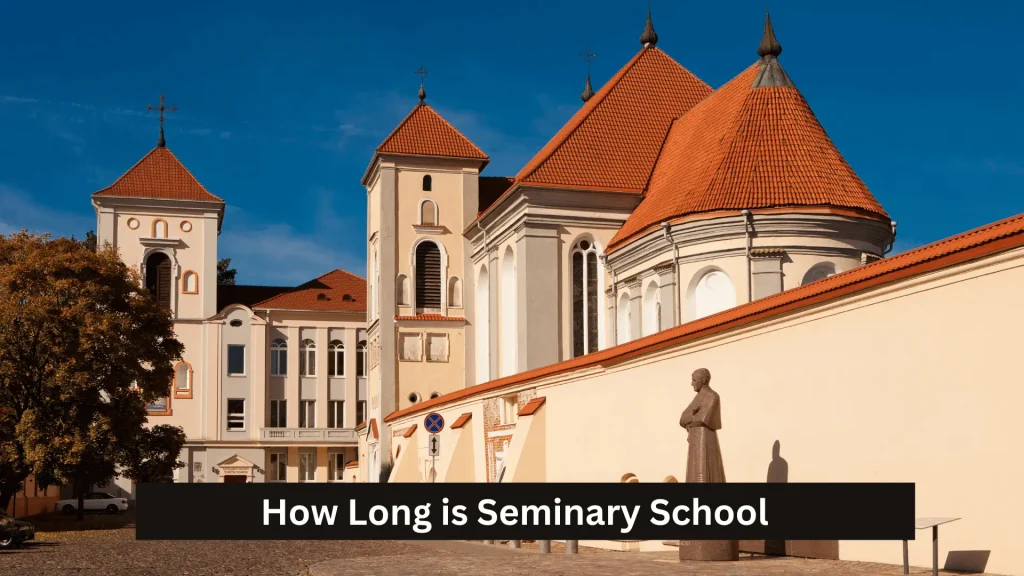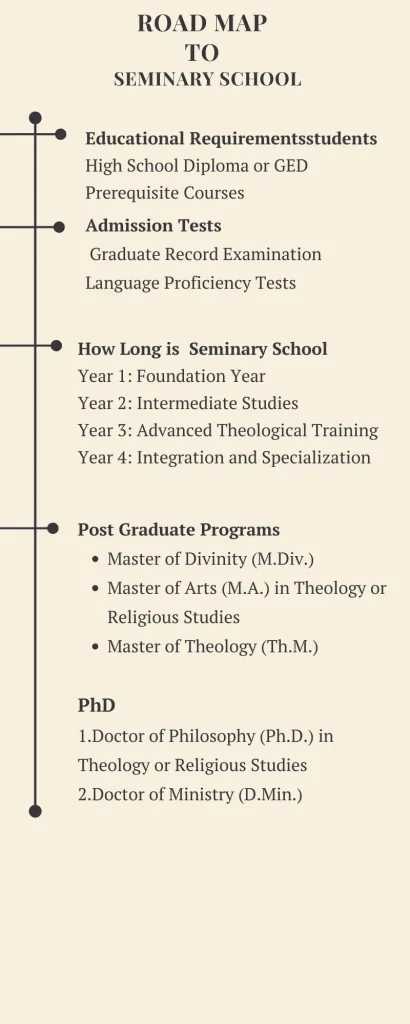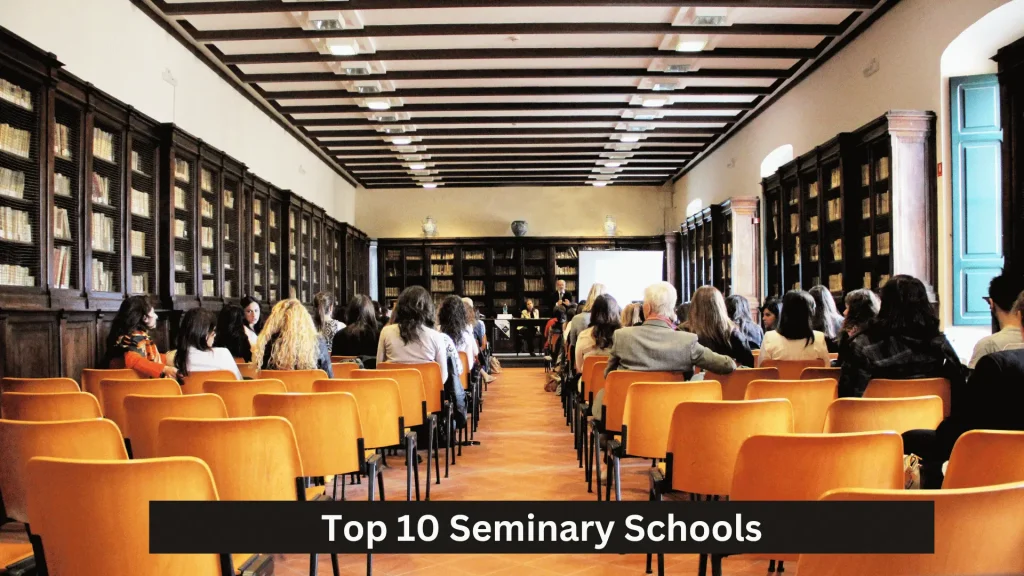How Long is Seminary School
How Long is Seminary School? Typically, seminary programs range from three to four years, depending on the degree pursued. Master of Divinity (M.Div.) programs usually take three years, while advanced degrees or additional specializations may extend the duration. This timeframe equips students with the theological education and pastoral training needed for ministry.
What is Seminary School
Seminary school is an institution dedicated to training individuals for religious leadership, primarily within the Christian faith. Students engage in rigorous academic study, focusing on theology, biblical studies, and pastoral care. This education prepares them for roles such as pastors, priests, and religious educators, providing the knowledge and skills necessary for effective ministry.

In addition to academic coursework, seminary schools often include practical training components like internships, fieldwork, and spiritual formation activities. These experiences allow students to apply their learning in real-world settings, developing their ministerial capabilities and deepening their spiritual lives. Overall, seminary school is a comprehensive program aimed at equipping future religious leaders with both theoretical knowledge and practical skills.
How Long is Seminary School
Year 1: Foundation Year:
The first year of an undergraduate seminary program typically focuses on foundational courses in theology, biblical studies, and church history. Students are introduced to key religious texts, basic theological concepts, and the historical context of their faith tradition. General education courses in philosophy, literature, and humanities are also included to provide a well-rounded academic base.
Year 2: Intermediate Studies:
In the second year, students delve deeper into theological studies and biblical exegesis. Courses may include systematic theology, ethics, and pastoral care. Students begin to develop critical thinking skills and engage in more complex theological discussions. Practical ministry courses may start, including introductory preaching and teaching methods.
Year 3: Advanced Theological Training:
The third year emphasizes advanced theological topics and practical ministry skills. Students take specialized courses in areas such as homiletics, church administration, and counseling. Fieldwork or internships often begin, allowing students to gain hands-on experience in ministry settings. This year helps students apply their academic knowledge in real-world contexts.
Year 4: Integration and Specialization:
The final year focuses on integrating theological knowledge with practical ministry skills. Students may choose electives based on their interests, such as youth ministry, missions, or advanced biblical languages. A capstone project or thesis is often required, demonstrating their ability to conduct independent research and apply their learning. Internships continue, preparing students for post-graduate ministry roles.

Overall, an undergraduate seminary program provides a comprehensive education that combines academic study with practical ministry training, equipping students for various roles in religious leadership.
How to Enter Seminary School
Educational Requirements for Seminary School
High School Diploma or Equivalent: Most seminary schools require applicants to have completed high school or obtained a GED.
Undergraduate Degree: For graduate-level seminary programs like the Master of Divinity (M.Div.), a bachelor’s degree from an accredited institution is typically required.
Prerequisite Courses: Some programs may require specific undergraduate coursework in religious studies, philosophy, or related fields.
Entry Tests for Seminary School
GRE (Graduate Record Examination): Some seminary programs may require GRE scores, especially for more academically rigorous programs.
Language Proficiency Tests: For non-native English speakers, tests like the TOEFL (Test of English as a Foreign Language) may be required to demonstrate language proficiency.
Application Process for Seminary School
Application Form: Complete an online or paper application form available on the seminary’s website.
Transcripts: Submit official transcripts from high school and any post-secondary institutions attended.
Letters of Recommendation: Provide letters of recommendation from academic or religious mentors.
Personal Statement: Write a personal statement or essay outlining your vocational goals, faith journey, and reasons for pursuing seminary education.
Interview: Some schools may require an interview, either in-person or online, to assess your suitability for the program.
Application Fee: Pay the required application fee, which varies by institution.
Financial Aids for Seminary School
Scholarships: Many seminaries offer scholarships based on academic merit, financial need, or specific ministry interests.
Grants: Need-based grants may be available through the seminary or external religious organizations.
Student Loans: Federal and private student loans can help cover tuition and other expenses.
Work-Study Programs: Some schools offer work-study programs that provide part-time employment opportunities on campus.
Church Sponsorships: Certain denominations or local churches may offer financial support to members pursuing seminary education.
Tuition Assistance Programs: Some seminaries have tuition assistance programs for students who commit to serving in specific ministry roles post-graduation.
By understanding these components, prospective students can better prepare for the application process and financial planning for their seminary education.
Post Graduate and PhD Programs
Postgraduate and PhD Programs in Seminary School typically cater to students aiming for advanced theological studies and academic careers in religious education or leadership. Here’s an overview:
Postgraduate Programs
Master of Divinity (M.Div.):
A comprehensive program focusing on theological education and practical ministry preparation. It typically takes 3-4 years and includes coursework in biblical studies, theology, pastoral care, and field education.
Master of Arts (M.A.) in Theology or Religious Studies:
Offers specialized study in theological disciplines, allowing students to deepen their knowledge in areas like biblical languages, church history, or systematic theology.
Master of Theology (Th.M.):
A more advanced degree beyond the M.Div., providing concentrated study in a specific theological area. It often requires a thesis or research project.
PhD Programs
Doctor of Philosophy (Ph.D.) in Theology or Religious Studies:
Focuses on research and scholarly exploration of theological or religious topics. Students conduct original research and write a dissertation under the guidance of faculty.
Doctor of Ministry (D.Min.):
Designed for experienced ministry professionals seeking advanced training in pastoral leadership, counseling, or specialized ministry areas. Emphasizes practical application and research-based projects.
Top 10 Seminary Schools
When ranking the top seminary schools, several factors can be considered, including academic reputation, faculty quality, denominational affiliation, campus resources, and overall impact on theological education. Here are ten highly regarded seminary schools in the United States:

1. Princeton Theological Seminary (Princeton, New Jersey)
- Affiliation: Presbyterian Church (USA)
- Highlights: Known for its rigorous academic programs, esteemed faculty, and strong emphasis on both Reformed theology and ecumenical dialogue.
2. Yale Divinity School (New Haven, Connecticut)
- Affiliation: Interdenominational
- Highlights: Offers a diverse and inclusive environment, with strong emphasis on social justice, biblical studies, and ecumenical engagement.
3. Harvard Divinity School (Cambridge, Massachusetts)
- Affiliation: Nonsectarian
- Highlights: Known for its broad academic approach, integrating religious studies with other disciplines, and promoting interfaith dialogue.
4. Duke Divinity School (Durham, North Carolina)
- Affiliation: United Methodist Church
- Highlights: Offers strong programs in theology, ministry, and biblical studies, with a commitment to social justice and Christian formation.
5. Fuller Theological Seminary (Pasadena, California)
- Affiliation: Multidenominational
- Highlights: Recognized for its evangelical scholarship, innovative programs in psychology and intercultural studies, and commitment to holistic ministry training.
6. Union Theological Seminary (New York, New York)
- Affiliation: Independent, historically aligned with the Presbyterian Church (USA)
- Highlights: Known for its progressive theology, focus on social justice, and vibrant urban context.
7. Candler School of Theology (Atlanta, Georgia)
- Affiliation: United Methodist Church
- Highlights: Offers robust theological education, with strengths in Methodist studies, public theology, and global Christianity.
8. Southwestern Baptist Theological Seminary (Fort Worth, Texas)
- Affiliation: Southern Baptist Convention
- Highlights: Emphasizes conservative evangelical theology, strong pastoral training, and a commitment to missions and evangelism.
9. The Southern Baptist Theological Seminary (Louisville, Kentucky)
- Affiliation: Southern Baptist Convention
- Highlights: Known for its conservative theological stance, comprehensive ministry programs, and strong faculty.
10. Gordon-Conwell Theological Seminary (South Hamilton, Massachusetts)
- Affiliation: Multidenominational
- Highlights: Offers strong evangelical theological education, with strengths in biblical studies, pastoral ministry, and global missions.
Factors Affecting the Length of Seminary School
Several factors can influence the length of seminary school programs, impacting the duration of study for aspiring religious leaders:
Degree Program:
The type of degree pursued, such as a Master of Divinity (M.Div.), Master of Arts (M.A.), or doctoral programs, dictates the length. M.Div. programs typically last 3-4 years, while doctoral programs can extend to 5-7 years due to research requirements.
Course Load and Pace:
Full-time versus part-time enrollment affects program length. Full-time students typically complete seminary school sooner than part-time students due to a heavier course load per semester.
Field Education Requirements:
Programs that include field education, internships, or practicum experiences may require additional semesters to fulfill practical ministry requirements.
Thesis or Dissertation:
Research-based programs often culminate in a thesis or dissertation. Writing and defending this scholarly work can extend the program length, especially in doctoral programs.
Denominational Requirements:
Some seminaries align closely with specific religious denominations, incorporating additional coursework or practical training mandated by those affiliations, which can lengthen the program.
Personal Pace and Readiness:
Individual student readiness, academic background, and personal circumstances can influence the pace at which coursework is completed, affecting overall program duration.
Final Verdict
Seminary school length varies, typically ranging from three to four years for a Master of Divinity (MDiv) program. Specialized programs may differ, with certificate courses lasting a few months to a year. Duration depends on full-time or part-time enrollment and the specific seminary’s requirements.
FAQs
1. How long does it take to complete seminary school?
The duration varies by program and enrollment status. A Master of Divinity (MDiv) typically takes three to four years full-time, while certificate programs may range from a few months to a year. Some part-time students may take longer to complete their studies.
2. What degree do you earn from seminary school?
Most students earn a Master of Divinity (MDiv), the standard degree for pastoral ministry. Other degrees include Master of Arts in Theology, Master of Theological Studies, and Doctor of Ministry (DMin). Certificate programs are also available for shorter, specialized study.
3. What are the admission requirements for seminary school?
Requirements vary but generally include a bachelor’s degree, letters of recommendation, a personal statement, and sometimes an interview. Some schools may also require ministry experience or denominational endorsement, especially for ordination-track programs.
4. Can I attend seminary school online?
Yes, many seminaries offer online programs or hybrid formats combining online and on-campus coursework. Online options provide flexibility for students balancing ministry, work, or family commitments, though some programs may require occasional in-person attendance.
5. What career opportunities are available after seminary school?
Graduates pursue careers in pastoral ministry, chaplaincy, teaching, counseling, and nonprofit leadership. Some work in academic settings or continue to advanced theological studies. Career paths depend on individual interests, denominational requirements, and the specific degree earned.
